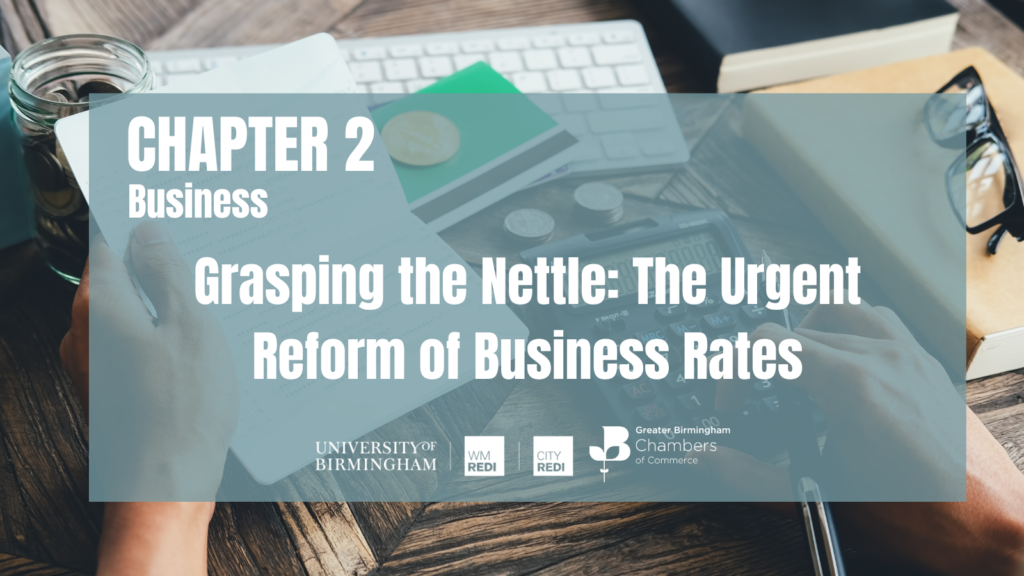
John Webber, Director & Head of Rating at Colliers, discusses how the current business rates system needs reform. With rate bills becoming increasingly unaffordable for many businesses and the appeal process overly complex and costly, urgent action is needed to address the unsustainable nature of the system.
This article was written for the Birmingham Economic Review 2023.
The review is produced by City-REDI/ WMREDI, the University of Birmingham and the Greater Birmingham Chambers of Commerce. It is an in-depth exploration of the economy of England’s second city and a high-quality resource for informing research, policy and investment decisions.
“There is wide agreement that the current business rates system needs urgent reform. Yet successive governments have totally failed to grasp the nettle and just tinkered around the system or put it in the “too difficult box”.
The system which provides £32 billion gross (£26 billion net) for local authority funding is just unsustainable in its current form. The main issues are that rate bills are just too high and increasingly unaffordable for many businesses and the appeal process for those who disagree with their assessments is lengthy, complicated and costly.
Rate Bills
Rate bills are linked to the level of the multiplier (the uniform business rate which is multiplied by the rateable value of the property (RV) to calculate the rates bill). This has crept up over the past 30 years from 34p in 1990 to 51p today, thus creating a huge 51% tax on the rental value of a property. And with inflation, as it is, the multiplier will only get higher. Nowhere else in Europe do businesses pay half the rental value of premises in property taxes. This multiplier is the elephant in the room and until it is tackled any other changes to the system are window dressing.

The problem has been compounded by the fact that successive governments, rather than dealing with the growing burden of business rates, have instead found it politically expedient to hand out concessions and reliefs on a regular basis. As a result, out of 2.15 million properties in the rating list, 700,000 do not pay any business rates taxes, so that burden falls on those businesses that do not benefit from any reliefs that currently exist.
This situation will only get worse as the public finances require a sum of £26 billion. The poor state of the public purse means this sum will continue to grow, particularly in a relatively high inflationary environment. In fact, according to the OBR report, it seems that the Government is now forecasting that income from business rates is only going one way- upwards. Forecasts predict the income will rise to nearly £36 billion by 2027/28! If this leads to more relief, the result will be an even greater burden on a smaller number of businesses able to pay their rates bills. This is unsustainable.
Unless the 700,000 ratepayers start to pay something or a large proportion of the £26 billion sum is collected from some other tax resource, then the situation will worsen, and business rates will continue to be used as a political football.
So, what’s to be done?
At Colliers we have drawn up a manifesto for reform, the main components of which are:
To start with we suggest the government rebates the Multiplier to a level that businesses can afford- to say 34p in the £. A lower fairer UBR would reduce the barriers to entry, help expansion and innovation for businesses and encourage growth. It would broaden the tax base, disincentivise tax avoidance and help reduce any gaps in revenue for the Exchequer caused by a lower UBR.
Next, we would reform the sticking plaster relief system. Re-basing the multiplier to something affordable will mean that the whole question of the myriad of reliefs can become simplified and resolved, as not so many businesses will need to claim them. Everyone who benefits from public utilities and local services needs to pay something- but at a fair rate, maybe starting at 10 or 15% for the smaller businesses. We believe reliefs should be reviewed at least every 3 years.
We would also introduce annual revaluations. The Government has moved from five-yearly revaluations to three-yearly revaluations, which is a step in the right direction, but in our view not far enough. By implementing annual revaluations, business rate bills will accurately reflect the dynamic movements of the market and allow occupiers to benefit immediately from adjustments to rateable values. This would have certainly helped the retail sector in the long period between the 2017 and 2023 Revaluation when many retailers were paying far too high business rates for far too long. The consequences for many high streets were dire.

And fourthly we would reform the appeal system and demand transparency from the VOA. The current system makes it too hard for businesses to either assess the fairness of their assessments or to appeal to them. Recent tinkering with (CCA) and removing the Check part of the system has only added to the confusion and the request for the annual provision of information from the ratepayer has also added a significant administrative burden.
We believe the current system needs to be transparent, easy to access for all and allow appeals to be resolved in 12 months so that businesses can get on with what they do best- running their businesses.
In its 2019 Manifesto, the Conservative Party promised, “To cut the burden of tax on business by reducing business rates. This will be done via a fundamental review of the system.“ Sadly, it still has not fulfilled this promise. And the Labour Party’s stance is no better. Labour has threatened to abolish business rates altogether if it gets into power- but its plans on what to replace them with remain woolly. Suggestions of a Land Tax would create its own issues and would be difficult to implement.
What we need is a well-managed and transparent business rates system, and we need it now. The government must not continue to ignore the call for urgent reform and finally help businesses floundering in this over burdensome and unfair system.”
This blog was written by John Webber, Director & Head of Rating at Colliers.
Disclaimer:
The views expressed in this analysis post are those of the author and not necessarily those of City-REDI, WMREDI or the University of Birmingham.
